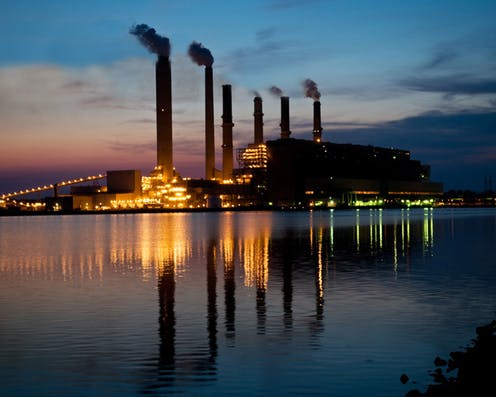His eye on the upcoming election, Donald Trump keeps repeating that the US economy is on an upswing and the “phenomenal job” of his administration did is responsible. “So we built the greatest economy in history… we close it down because of the China plague… and now we’re reopening, and we’re doing record business,” he alleged during the first presidential debate with Joe Biden on September 29. According to Trump, his administration put 10.4 million Americans back to work in just four months.
Some positive signs
In terms of the short-term job numbers, the claim is correct: The Bureau of Labor Statistics indicates an upturn since May, bringing hope that the current recession, which is of historic proportions, may be short-lived.
This hope is fueled by some encouraging economic news. Before the 2019 outbreak of the pandemic, the country experienced an increase in median household income that to a certain extent also benefited poorer Americans. So the current economic woes should not overshadow the progress made – a result, claim Trump supporters, of the administration’s deregulatory measures and the controversial “Tax Cuts and Jobs Act” of 2017.
The rebound in stock values raised morale in some quarters, at least temporarily. Americans’ net worth in 2020 increased by nearly 7% in the second quarter – the biggest rebound in the country’s history. It is now known that some well-off Americans used the money they received from the federal government’s stimulus package to invest in stocks rather than make purchases, which is the point of any stimulus package.
Trump’s job-creation claim is also misleading: According to the same source, 22 million jobs were lost when the pandemic hit in the spring, so that the net result is still a loss of nearly 12 million jobs. The figure also masks the fact that many other jobs may be temporarily or even permanently lost. According to recruitment agency Indeed, job postings in New York and California, two states that at the heart of the US economy, are down 30% compared to 2019.
The end of the longest economic boom
After a short-lived upswing, other regions are seeing a drop in job offers again. US worker mobility helped correct labor-market imbalances in the past, but it is less effective in the face of a nationwide pandemic. The possibility of a lasting job-creation slowdown seems more than likely; hard-hit sectors include aviation, which has been hit with waves of layoffs, and tourism, as illustrated by Disney’s laying off 28,000 employees.
According to UBS economist Brian Rose, as many as 5 million Americans may have lost their jobs permanently. In October, the US economy created fewer than 700,000 jobs, a sure sign of the ongoing labor-market slowdown observed since May. This shows the limited impact of the stimulus package.
So the president’s pre-election enthusiasm should not obscure the fact that in view of the uncertain economic outlook, the road to a true recovery could be very long. Using a stimulus package in an attempt to the public is less effective at a time of deep political division and a health crisis caused by a deadly virus. Those who were hoping for a V-shaped recovery, with a swift rebound when the health restrictions have been lifted, now fear it will be more of a “swoosh”, with a massive drop followed by a slow and uncertain recovery.
Even worse is the prospect of a K-shaped recovery, with the wealthy coming out on top thanks to their accumulated capital and the stock market, and more vulnerable sectors and minority groups durably impacted by the pandemic. This is confirmed by the Census Bureau’s figures on retail and food services. Similarly, the disconnect between stock markets and the US consumer-confidence index suggests that many Americans, particularly those who are most vulnerable, may not benefit from a recovery.
The economic crisis triggered by the Covid-19 pandemic brought an abrupt end to the longest economic expansion in US history – 128 months of growth, eight more than the previous record, between the Cold War and 9/11. If the recovery is slow and uneven – and data indicate that that may well be the case – it could profoundly damage the president’s chances of reelection.
The Fact check US column is supported by Craig Newmark Philanthropies, an American foundation fighting disinformation.
Translated from the French by Sally Laruelle for Fast ForWord



 South Africa Eyes ECB Repo Lines as Inflation Eases and Rate Cuts Loom
South Africa Eyes ECB Repo Lines as Inflation Eases and Rate Cuts Loom  Global Markets Slide as AI, Crypto, and Precious Metals Face Heightened Volatility
Global Markets Slide as AI, Crypto, and Precious Metals Face Heightened Volatility  U.S.-India Trade Framework Signals Major Shift in Tariffs, Energy, and Supply Chains
U.S.-India Trade Framework Signals Major Shift in Tariffs, Energy, and Supply Chains  Gold and Silver Prices Rebound After Volatile Week Triggered by Fed Nomination
Gold and Silver Prices Rebound After Volatile Week Triggered by Fed Nomination  Bank of Japan Signals Readiness for Near-Term Rate Hike as Inflation Nears Target
Bank of Japan Signals Readiness for Near-Term Rate Hike as Inflation Nears Target  Australian Household Spending Dips in December as RBA Tightens Policy
Australian Household Spending Dips in December as RBA Tightens Policy  Russian Stocks End Mixed as MOEX Index Closes Flat Amid Commodity Strength
Russian Stocks End Mixed as MOEX Index Closes Flat Amid Commodity Strength  Indian Refiners Scale Back Russian Oil Imports as U.S.-India Trade Deal Advances
Indian Refiners Scale Back Russian Oil Imports as U.S.-India Trade Deal Advances  India–U.S. Interim Trade Pact Cuts Auto Tariffs but Leaves Tesla Out
India–U.S. Interim Trade Pact Cuts Auto Tariffs but Leaves Tesla Out  RBI Holds Repo Rate at 5.25% as India’s Growth Outlook Strengthens After U.S. Trade Deal
RBI Holds Repo Rate at 5.25% as India’s Growth Outlook Strengthens After U.S. Trade Deal  Singapore Budget 2026 Set for Fiscal Prudence as Growth Remains Resilient
Singapore Budget 2026 Set for Fiscal Prudence as Growth Remains Resilient  Trump Lifts 25% Tariff on Indian Goods in Strategic U.S.–India Trade and Energy Deal
Trump Lifts 25% Tariff on Indian Goods in Strategic U.S.–India Trade and Energy Deal  Dow Hits 50,000 as U.S. Stocks Stage Strong Rebound Amid AI Volatility
Dow Hits 50,000 as U.S. Stocks Stage Strong Rebound Amid AI Volatility  Asian Stocks Slip as Tech Rout Deepens, Japan Steadies Ahead of Election
Asian Stocks Slip as Tech Rout Deepens, Japan Steadies Ahead of Election  Oil Prices Slip as U.S.-Iran Talks Ease Middle East Tensions
Oil Prices Slip as U.S.-Iran Talks Ease Middle East Tensions 
































